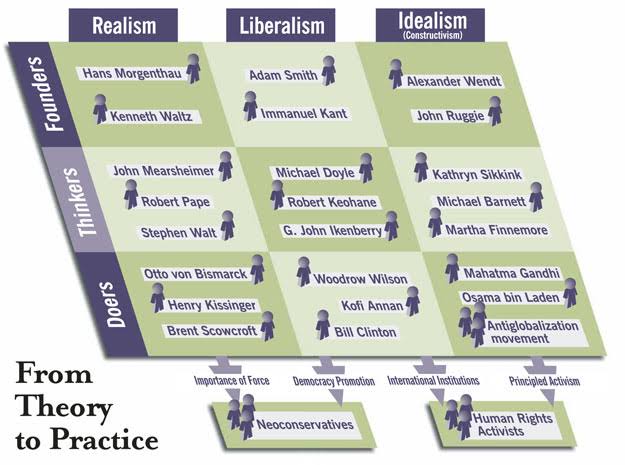International Relations versus international relations
International Relations (IR), as a field of study, differs significantly from the general concept of international relations. When capitalized, International Relations refers to an academic discipline that systematically analyzes and theorizes the interactions among various global actors. In contrast, when written in lower case, the term pertains to the actual political, economic, and social interactions that occur between countries.
The History of International Relations Study
Tracing its roots back to the early 20th century, the formal study of IR has evolved significantly. Key authors like E.H. Carr and Hans Morgenthau laid foundational theories in the mid-20th century, with Carr’s “The Twenty Years’ Crisis” (1939) and Morgenthau’s “Politics Among Nations” (1948) being seminal works. These authors helped establish Realism as a dominant perspective.
The modern study of International Relations (IR) has gained immense popularity worldwide, reflecting the increased interconnectedness of global affairs. The field is particularly prominent in the United States, United Kingdom, and Europe, where many of the leading universities and think tanks are located. In recent years, there’s been a notable surge in IR studies in Asia, particularly in countries like China and India, as they play more significant roles on the global stage. This expansion highlights a growing recognition of the importance of understanding complex international dynamics and the role of different nations in shaping global policies and politics.

The Importance of IR as a Field of Study
IR is crucial for understanding global politics, economics, and societal changes. It provides tools to analyze complex international issues, predict future trends, and offer solutions to global challenges. This field helps in shaping foreign policies, international agreements, and the global economic order.
Students of International Relations often pursue diverse and dynamic career paths. Common sectors include diplomacy, where they can work as diplomats or foreign affairs analysts. Many find roles in international organizations like the United Nations or the European Union, working on global issues such as human rights, peacekeeping, or environmental policy. In the private sector, opportunities exist in international business, consulting, and risk analysis. Additionally, some graduates gravitate towards academia, research, or journalism, focusing on international affairs. The field’s interdisciplinary nature opens doors in various sectors, reflecting the globalized nature of today’s world.
Key IR Theories and Their Evolution
- Realism (Mid-20th Century): Focused on state power and security.
- Liberalism (Post-World War II): Advocated for cooperation and international institutions.
- Constructivism (1980s): Stressed the role of social constructs in international politics.
- Marxism (Mid-20th Century): Examined the influence of economic structures on international relations.
- Feminism (1980s-1990s): Highlighted gender roles in global politics.
- Post-Colonialism (Late 20th Century): Focused on the impact of colonial history on current international relations.

The study of IR continues to evolve, adapting to the dynamic nature of global interactions and challenges.
Being an internationalist isn’t just about following global events; it’s about analyzing them through various theoretical lenses. These theories provide students and practitioners with frameworks to dissect complex international phenomena. By applying these theories, internationalists can better comprehend why states behave in certain ways, predict potential outcomes of international disputes, and devise more informed policies.
This analytical approach is essential because global politics are not random or chaotic; they follow patterns and structures that theories help to uncover and explain. In a world where international events have far-reaching impacts, being able to analyze these events thoughtfully and critically is not just important, it’s imperative for informed decision-making and effective diplomacy.
In Conclusion, Study International Relations!
Studying International Relations (IR) offers more than just a pathway to a variety of careers; it opens a window to understanding the complex systems of global interactions. As our world becomes increasingly interconnected, the skills and insights gained from IR are invaluable in navigating and shaping the future.
For students and individuals looking to make a meaningful impact, IR provides the tools to understand global dynamics and contribute to a more understanding and harmonious world.
Whether it’s in diplomacy, international business, academia, or beyond, a background in IR empowers you to be a part of the global conversation and an architect of change.
Join the ranks of those who strive not just to understand the world, but to improve it.









No responses yet